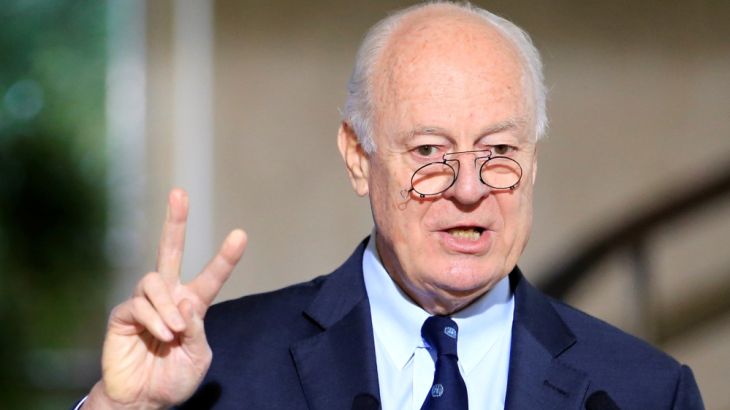UN’s de Mistura expects no breakthrough in Syria talks
UN’s Staffan de Mistura plays down expectations for progress as government and opposition officials gather in Geneva.

Geneva, Switzerland – The United Nations mediator for the talks on the war in Syria, Staffan de Mistura, has played down expectations for major progress before planned negotiations in the Swiss city of Geneva.
“Am I expecting a breakthrough? No, I am not expecting a breakthrough,” he told journalists at the UN headquarters on Wednesday, a day before the start of the fourth round of talks aimed at finding a political solution to Syria’s long-running conflict.
Though the Geneva talks are seen as the most serious diplomatic effort in months, disputes over the agenda and long-standing disagreements between the opposition and the government on the future of Syria have cast doubts on whether any progress will be achieved.
READ MORE: After six years of war, low hopes for Syria peace talks
De Mistura said he was determined to maintain “a very proactive momentum” to allow for political discussions on governance, a new constitution and elections under UN supervision, based on the UN Security Council Resolution 2254.
In recent days, however, the UN mediator has shied away from using the phrase “political transition” – a term the Syrian opposition equates with the removal of President Bashar al-Assad – to describe the goal of the talks.
During previous rounds of UN-led negotiations, the Syrian government categorically refused to discuss Assad’s fate – the main bone of contention between the two sides.
|
|
Opposition divisions
The intra-Syrian talks come on the heels of multilateral meetings – facilitated by Russia, Turkey and Iran – in the Kazakh capital of Astana to consolidate a fragile nationwide truce brokered by Russia and Turkey, in place since December 30.
The negotiations in Astana were meant to pave the way towards political negotiations in Geneva, but the ceasefire has steadily fallen apart over the past month, while promises to establish a monitoring mechanism were not fulfilled.
Officials from the opposition delegation, split between military and political representatives, similarly expressed little hope for the talks.
“When the adherence to the ceasefire is not there,” and when there are “games being played at the level of international terms of reference to political transition and a constitution […] then the negotiations are not encouraging,” Yehya al-Aridi, adviser to the High Negotiations Committee, the main opposition umbrella organisation, told Al Jazeera.
“Things are getting complicated further and further, with conflicting agendas. Not only from the main two banks of the conflict, but also within our bank,” he told Al Jazeera.
Infighting within rebel ranks has severely weakened and divided the Syrian opposition over the past month.
That, coupled with uncertainty surrounding US policy on Syria under President Donald Trump, a shift in the priorities of Turkey – traditionally a backer of Syrian rebel groups – and Russia’s 2015 military intervention in support of Assad, has left the opposition with little leverage, either politically or militarily.
“There are no solutions in sight now. The reality on the ground is getting worse,” Fares Bayoush, a Free Syrian Army commander, told Al Jazeera.
Omar Kouch, a Syrian analyst, said that while the presence of a ceasefire makes this round of talks markedly different, “there are no indications that the fourth Geneva talks will be serious about finding a solution”.
Kouch said the chances for reaching a solution are slim, citing the continued government offensives on several areas across Syria, the absence of the dominant Syrian Kurdish faction – the Democratic Unity Party (PYD) – at the negotiating table and major divisions within the opposition.
“As in every round of talks, we start with a lot of hope to find a solution, but then the talks are over and nothing is accomplished. In fact, things get worse,” he told Al Jazeera.
With both sides seemingly unwilling to make political concessions, it is unclear how the negotiations could bridge the divide and find a solution.
Still, the Syrian opposition is expected to press for the consolidation of the ceasefire, the release of prisoners, the lifting of the blockades over besieged areas and securing a political transition from Assad’s government.
“The main thing is that there is no submission. We are trying very hard, to decrease the losses,” said Aridi.